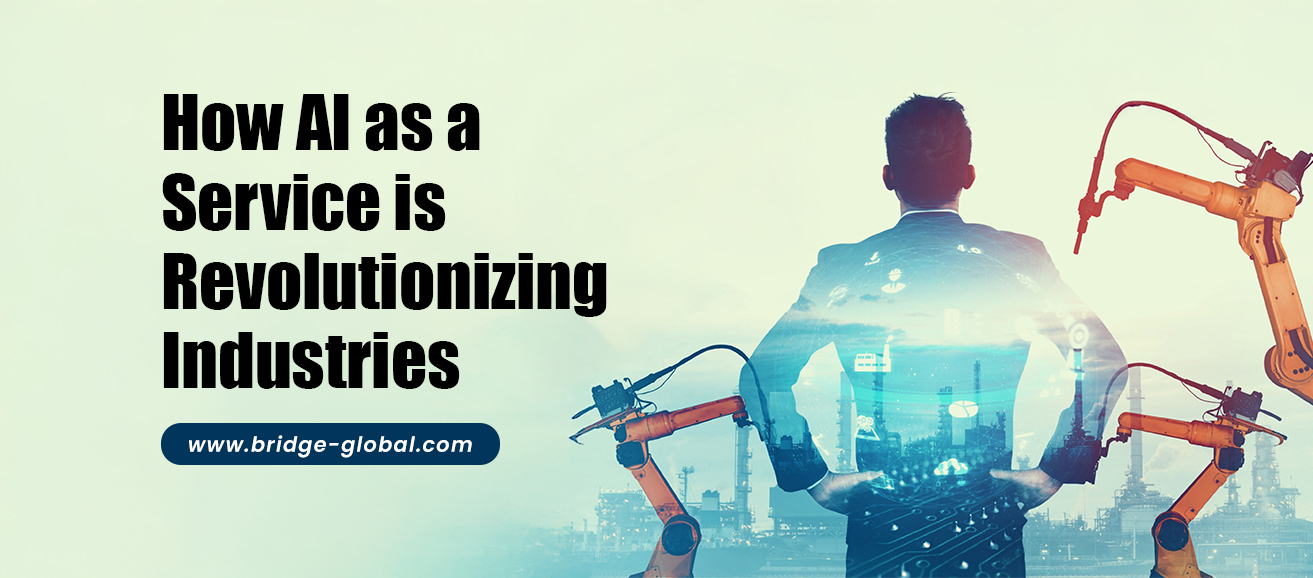AI as a Service: Revolutionizing Business and Industries
In 2025, the promise of artificial intelligence has shifted from future vision to present-day reality. It has become the force reshaping modern businesses across entertainment, finance, healthcare, logistics, and beyond. The initial wave of experimentation has matured into widespread use of AI as a service, serving as the scalable foundation for innovation across enterprise footprints. By partnering with an AI development company, organizations are adopting AI software solutions that automate routine tasks, elevate decision-making, and create customized experiences for customers. With the advent of generative AI development and mobile app development projects, it is clear: businesses must embrace artificial intelligence development to thrive.
The beauty of AI as a service lies in its flexibility and accessibility. Companies of all sizes - startups, non-profits, mid-tier firms - can tap into sophisticated AI capabilities through cloud platforms, often bypassing costly on-prem infrastructure. Reputable providers like Amazon Web Services, Microsoft Azure, and Google Cloud, alongside nimble AI software development companies, offer plug‑and‑play solutions such as predictive analytics, virtual assistants, image and speech recognition, and decision-support tools. These turnkey models allow organizations to rapidly deploy AI, often seeing tangible benefits within weeks, as opposed to traditional, multi-million dollar AI projects.
AI as A Service: Real-World Industry Impact

Retail: Hyper-Personalization at Scale
Retailers today no longer compete on price alone - they compete on experience. By leveraging AI as a service via plug-and-play models, brands can analyze purchasing trends, social sentiment, and browsing behavior to predict preferences before customers even search. These insights fuel recommendation engines and content personalization that drive loyalty and lift conversions. Meanwhile, AI customer service chatbots and virtual assistants now handle routine support - order tracking, refunds, FAQs - learning from interaction history so each response feels personal. Through a combination of AI software solutions and infrastructure-as-a-service models, retailers are making digital engagement feel human - and achieving growth faster than ever.
Healthcare: Smart Diagnostics and Operational Efficiency
The healthcare sector has embraced AI as a service to enhance patient care and streamline operations. Today’s ML-powered systems spot patterns in medical images and electronic health records that often elude human clinicians. By 2025, many hospitals are using predictive diagnostics (e.g., cancer, cardiovascular disease) with higher accuracy than ever compared to just a few years ago. Beyond diagnostics, AI helps optimize patient flow, predict equipment maintenance, and manage surgical schedules - delivering better outcomes at lower cost.
Virtual medical assistants powered by AI filter symptoms, accelerate triage, and reduce administrative burden on clinical staff. These AI software solutions are built through partnerships with AI software development companies and differ from traditional tools due to their flexibility: they build on cloud-enabled modules and integrate into workflows in days or weeks. As a result, efficiency improves dramatically, and quality of care increases without adding headcount.
Financial Services: Instant Risk and Fraud Control
Speed and accuracy define success in finance. Banks and fintechs are using AI as a service to analyze transactions in real time, detecting and stopping fraud with far greater speed and precision than rule-based systems. Machine learning models sift through millions of transactions to spot suspicious patterns, enabling faster decision-making for trust and risk.
Loan underwriting has evolved too: instead of relying on credit scores alone, modern platforms integrate behavioral data, transaction history, and even social indicators. The result: fairer lending decisions that may not have been possible before. Conversational AI agents in support roles are handling complex queries about mortgages, investments, and accounts, freeing human advisors to address nuanced customer needs.
Manufacturing: Predictive Maintenance & Smart Supply Chains
Factories are now tapping into AI as a service capabilities to power predictive maintenance, using sensor data and ML models to detect anomalies before machinery fails. By anticipating breakdowns, manufacturers avoid costly downtime, reduce waste, and create safer environments. Through integrated dashboards, data from multiple plants can be aggregated and analyzed - enabling enterprise-wide visibility without elaborate in-house development.
On the logistics side, AI-enabled supply chain tools forecast demand, optimize route planning, evaluate suppliers based on performance, and manage inventory with sophisticated algorithms. Smaller players, traditionally sidelined by high tech costs, can now run simulations and adjust strategies against volatility using cloud-based tools provided by AI integration services and AI software development companies.
Entertainment: Personalized Engagement & Content Crafting
Even entertainment is getting redefined. Streaming platforms build on recommendation models powered by generative AI development to curate movies and content suited to individual tastes. Beyond that, cloud-based AI is helping creators generate music, design thumbnails, edit footage, and even auto-write story arcs. These tools are democratizing creativity - opening doors for independent creators and studios alike.
By 2025, dynamic storytelling - where narratives shift based on viewer behavior - is no longer fantasy. AI-scripted variations and interactive content flow naturally, thanks to AI as a service models that pair generative AI development with scalable ML engines.
Customer Service: The New Baseline
Customer expectations have permanently changed. Today’s consumers expect immediate help 24/7, personalized attention, and quick resolution. Thanks to AI as a service, businesses can deploy full-featured chatbots trained on historic interactions, sensitive to tone, context, and even multiple languages. These tools connect to CRM systems, APIs, and escalate to humans when needed. Better still, they analyze emotional cues and flag dissatisfaction early - allowing human agents to step in where empathy is required.
Alongside AI scripting engines come dashboards that track satisfaction, identify friction points, and highlight opportunities for improvement - all updated in real time. Efficiency climbs, customer experience improves, and loyalty increases.
Democratizing Innovation
The power of AI as a service is leveling the playing field. Startups and SMEs now access the same power once reserved for tech giants. A small e-commerce store or regional NGO can deploy AI tools within days - no need for in-house ML teams or pricey data centers. This trend spurs cross-industry innovation, with retail, healthcare, logistics, finance, and energy mixing insights and technologies. The result is rapid concept testing, frictionless integration, and innovation that scales in real time.
Ethics and Governance Challenges
But this revolution isn’t without pitfalls. As AI as a service proliferates, privacy, bias, and accountability become pressing concerns. Who is responsible when an AI makes a discriminatory decision? How transparent are these systems when reasoning? Today, companies and regulators are developing AI governance frameworks - requiring explainability audits, fairness reviews, and compliance with data laws. Enterprises are now expected to keep track of AI behavior and performance over time, ensuring trust remains intact.
Evolving Workforce: Upskilling and New Roles

The rise of AI as a service will reshape the workforce. Automation affects repetitive roles, but it also creates new opportunities for “prompt engineers,” trainers, ethicists, and integrators. These roles require both technical know-how and human insight - as artificial intelligence development becomes central to business. Companies investing in AI literacy are better positioned for success - just as Excel skills were essential in the past, now, proficiency with AI architectures matters.
Employees will find themselves empowered by AI, not replaced. Designers will work alongside AI software solutions to co-create, marketers will harness predictive models for decision-making, and developers will embed intelligent features into apps and systems - ushering in a collaborative era between humans and machines.
Why AI as a Service Is Unstoppable
Compared to bespoke enterprise AI, AI as a service offers speed, flexibility, and cost-efficiency. It reduces entry barriers, provides on-demand upgrades, and offers scalable pay-as-you-go models. This versatility allows companies to test concepts quickly, pivot based on market signals, and scale purposefully - all hallmarks of modern business success.
Increasingly, organizational leaders agree: adoption timing matters more than adoption itself. Those who wait risk falling behind as competitors use AI to innovate, delight customers, and optimize costs. Today's focus is on mindfully pairing AI with business strategy, culture, and ethics - turning AI integration into a strategic differentiator.
Conclusion
In 2025, AI as a service has become the backbone of digital transformation. It's no longer optional - it's essential. From retail to manufacturing, financial services to entertainment, the ability to rapidly deploy AI software solutions, coupled with seamless AI integration services, defines success. Partnering with an AI development company brings the benefit of tailored artificial intelligence development and generative AI development, helping organizations harness AI’s power responsibly.



